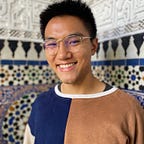The Simplest, Most Reliable Way To Get Into an Ivy-League College in 2021
We call this tried and true strategy the “Double-Edge” method
(Link to Chinese version here: 阅读简体中文版)
If you learn anything from this article, it should be this: colleges are looking for diverse classes, not diverse individuals.
But don’t take my word for it. Let’s see what Harvard Dean of Admissions and William R. Fitzsimmons had to say about the matter this past spring:
“We have the most diverse class in the history of Harvard this year (2021), economically and ethnically. This is an incoming group of students who’ve had experiences unlike any experiences first-year students have had in the history of Harvard or history of higher education.”
At first glance, it seems like your typical corporate-speak. But underneath the buzzwords, lies two key insights:
1: Top schools take immense pride in the diversity of their classes and are making concerted efforts to include students from all walks of life. This is incredibly good news to low-income students of color. In fact, being FGLI is kind of like a superpower here; it significantly boosts your chances of getting into college. Interestingly enough, the more selective the college, the more money they have for financial aid and the more your underprivileged background works in your favor.
2: Colleges are acutely searching for students with unique and unusual experiences. Needless to say, if you want to get into college, you absolutely must succeed at sharing those experiences in your essays with poise and maturity while simultaneously offering original insights. If you’re reading this as 9–10th grader, this also means you should work on collecting unique and unusual experiences. This can be done through interesting jobs, volunteer experiences, summer programs, clubs, extracurriculars, and more.
Let’s take this analysis one step further.
When colleges announce they have “the most diverse class ever,” they’re actually sending us a coded message since diverse classes are made of specialized individuals, not diverse ones. Please read that last sentence again, since this is probably the biggest misconception about college admissions.
Colleges would rather you specialize in a particular field, let’s say, medicine, and do 3–4 extracurriculars well (i.e. publish research at a local university, volunteer at a local clinic, teach first aid to younger kids and work at a veterinarian’s office) rather than run around like a chicken without your head trying to run 7–8 extracurriculars that have nothing to do with each other. Not only will the odds of getting into your dream school improve, but you’ll also work less, sleep more and benefit from improved mental health.
This approach can be applied to academics and course selection as well. If you know your specialization, or edge, will center on, let’s say, international relations, then take all the classes related to history, politics and economics at your school. Once you’ve exhausted all the resources there, conduct independent research, take online courses and go above and beyond with your curiosity. Spend your time and energy winning there rather than taking AP BC Calculus or AP Physics, especially if you’re feeling doubtful about how you’ll perform in those darned STEM subjects.
To be entirely frank, the advice I’m proposing (specialize, not diversify) is neither original or new. Go on YouTube, read Collegevine for a bit, peruse Prepscholar, and/or talk to other Ivy League grads and they’ll all tell you the same thing: if you pick a specific niche then dominate that category, you’re guaranteed to increase your odds of getting into the Ivy League. But the double-edged method is 100% my own. We have a ZhenEd patent and everything (no we don’t, but it would pretty sick if we did wouldn’t it?)
So what is the double-edge method?
In more recent years, lots of students have been employing this “edge” methodology to the point where it’s become a little trite and, dare I say, somewhat less effective. It’s one of those strategies where if everyone does it, then suddenly it doesn’t work quite as well as it used to. The solution? 1) Make your edge even more unique and 2) Add another edge — or even better, combine your existing edge with a secondary one.
1: Making your edge even more unique. Previously, I mentioned medicine as an edge, but truth be told, this is a bad example since lots of students want to study health. You know what would be an even better edge than simply medicine and health? Neuroscience. Yet even neuroscience is a relatively broad field, so what if we chose an even more narrow focus, such as debilitating memory disorders? Much better.
2: Combine your existing edge with a secondary one. Think of yourself like a video game character who has a primary ability and a secondary ability. While studying debilitating memory disorders might be your primary edge, your secondary one might be something a little more artistic, such as digital art. Again, let’s hone in on one particular category of digital art — in this case, I’ll use the example of motion-stop animation…
Now imagine if this imaginary student showcased their ingenuity and intellectual curiosity for neuroscience and digital art by starting a YouTube channel with motion-stop animations related to debilitating memory disorders? Or they partnered with a local nonprofit and made ads to help them fundraise using motion-stop animations? Not only are both of these incredibly exciting projects for students to undertake (since you literally just combine two of your biggest passions), it’s also incredibly attractive to college admissions officers.
This is it. The secret sauce. Don’t be selfish — share this article with a friend!
For more free content related to college admissions, personal development and life after uni, check out our founder Kevin’s YouTube channel: bit.ly/zhenseiyt
